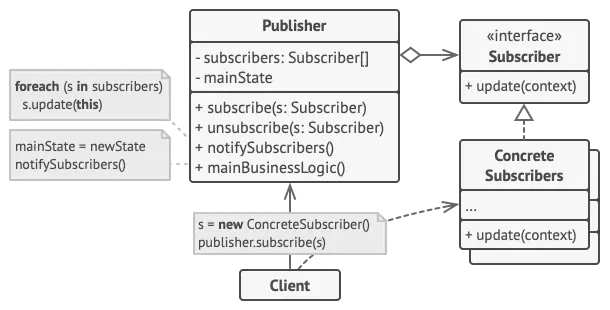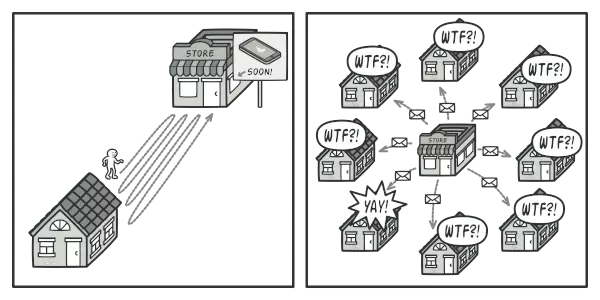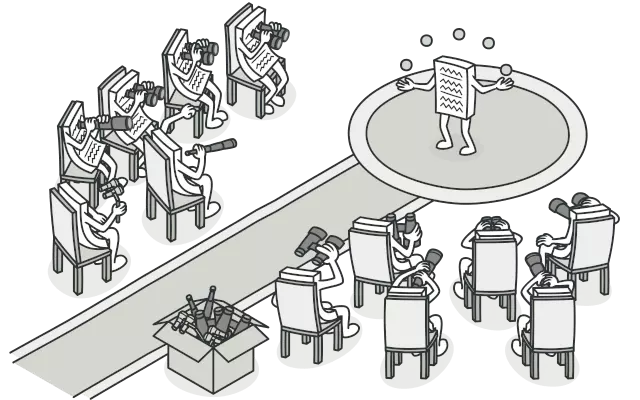Ha Noi, Wed 10/05/2023
At the moment, a little speech to give to the present...
Cơn mưa ngang qua mang em đi xa
Cơn mưa ngang qua khiến em nhạt nhòa...
Today, I listened to Son Tung's old song. I missed something in the past. At the same time as this song, I read a story on Voz that's name is "[Kể lại 1 câu chuyện] Đặt tên là "CƠN MƯA NGANG QUA". This story is very perfect, let's read it! 😊😊😊
I. Observer Pattern
Observer is a behavioral design pattern that lets you define a subscription mechanism to notify multiple objects about any events that happen to the object they’re observing.

Reference: Observer Pattern
II. Implement
1. The problem

Imagine that we have two objects: customers and the Apple Store.
The customer is a big fan of Apple, and he always wants to have the newest brand model whenever Apple introduces a new brand model. So, he must go to the Apple Store every day and ask the Apple Store's employees about the new brand model of Apple. Maybe it is still not available in the Apple Store, so he must spend lots of days going to the store.
Hmm, as in the image above, to resolve his problem, the store will notify and email all customers whenever the new brand model is available in the store. Nicely, the solution resolved his problem about spending time going to the store. But some customers like Android phones, so whenever they receive a notification about the new brand model from Apple, they are very angry and not happy.
2. The solution

So, to resolve this problem for him and some other customers who like Android phones, the store created a registration form to buy the new brand model. Whenever the product is available, the store will send a notification to all customers registered to buy iPhones.
So, to resolve the problem, we will use the Observer Pattern.
3. Implement Observer Pattern
3.1. Interface Publisher
ipublisher.go: This is the action interface of the publisher.
package publisher import "design-pattern-golang-example/observer_pattern/subscriber" type IPublisher interface { Subscribe(s subscriber.ISubscriber) UnSubscribe(s subscriber.ISubscriber) NotifySubscribes()
}
3.2. Concrete Publisher
apple_store.go: The publisher will handle and implement the logic for all actions that define by the interface publisher. Here, I define a publisher as Apple Store.
package concrete_publisher import ( "fmt" "time" "design-pattern-golang-example/observer_pattern/publisher" "design-pattern-golang-example/observer_pattern/subscriber"
) type AppleStore struct { Subscribers []subscriber.ISubscriber Name string
} func NewAppleStore(subscribers []subscriber.ISubscriber, name string) publisher.IPublisher { return &AppleStore{ Subscribers: subscribers, Name: name, }
} func (as *AppleStore) Subscribe(s subscriber.ISubscriber) { as.Subscribers = append(as.Subscribers, s) time.Sleep(1 * time.Second) fmt.Println(s.GetEmail() + " was subscribed...")
} func (as *AppleStore) UnSubscribe(s subscriber.ISubscriber) { subscribersUpdate := make([]subscriber.ISubscriber, 0) for _, sub := range as.Subscribers { if sub.GetEmail() != s.GetEmail() { subscribersUpdate = append(subscribersUpdate, sub) } } time.Sleep(1 * time.Second) fmt.Println(s.GetEmail() + " was unsubscribed...") as.Subscribers = subscribersUpdate
} func (as *AppleStore) NotifySubscribes() { for _, sub := range as.Subscribers { sub.SendEmail("We have had a new model of the iPhone") time.Sleep(1 * time.Second) }
}
3.3. Interface Subscriber
isubscriber.go: This is the action interface of the subscribers.
package subscriber // ISubscriber this is the observer
type ISubscriber interface { SendEmail(notification string) GetEmail() string
}
3.4. Concrete Subscriber
customer_subscriber.go: The subscriber will handle and implement the logic for all actions that define by the interface subscriber. Here, I define a subscriber as a customer.
package concrete_subscriber import ( "fmt" "design-pattern-golang-example/observer_pattern/subscriber"
) type Customer struct { Email string
} func NewCustomer(email string) subscriber.ISubscriber { return &Customer{Email: email}
} func (c *Customer) SendEmail(notification string) { content := fmt.Sprintf(`Sending the notification for %s with content "%s"`, c.GetEmail(), notification) fmt.Println(content)
} func (c *Customer) GetEmail() string { return c.Email
}
3.5. Main Function
main.go: Hàm chạy chương trình
package main import ( "time" "design-pattern-golang-example/observer_pattern/publisher/concrete_publisher" "design-pattern-golang-example/observer_pattern/subscriber" "design-pattern-golang-example/observer_pattern/subscriber/concrete_subscriber"
) func main() { // init publisher appleStore := concrete_publisher.NewAppleStore([]subscriber.ISubscriber{}, "apple store") // init observer subscriberOne := concrete_subscriber.NewCustomer("subscribe-one@gmail.com") subscriberTwo := concrete_subscriber.NewCustomer("subscribe-two@gmail.com") // the observer subscribes publisher appleStore.Subscribe(subscriberOne) appleStore.Subscribe(subscriberTwo) // send notification time.Sleep(3 * time.Second) appleStore.NotifySubscribes() // the observer unsubscribes publisher appleStore.UnSubscribe(subscriberTwo) // send notification time.Sleep(3 * time.Second) appleStore.NotifySubscribes()
}
Result
subscribe-one@gmail.com was subscribed...
subscribe-two@gmail.com was subscribed...
Sending the notification for subscribe-one@gmail.com with content "We have had a new model of the iPhone"
Sending the notification for subscribe-two@gmail.com with content "We have had a new model of the iPhone"
subscribe-two@gmail.com was unsubscribed...
Sending the notification for subscribe-one@gmail.com with content "We have had a new model of the iPhone" Process finished with the exit code 0
III. Source code
-
Source code observer pattern: Example with Golang
-
Source almost popular design patterns: Design patterns